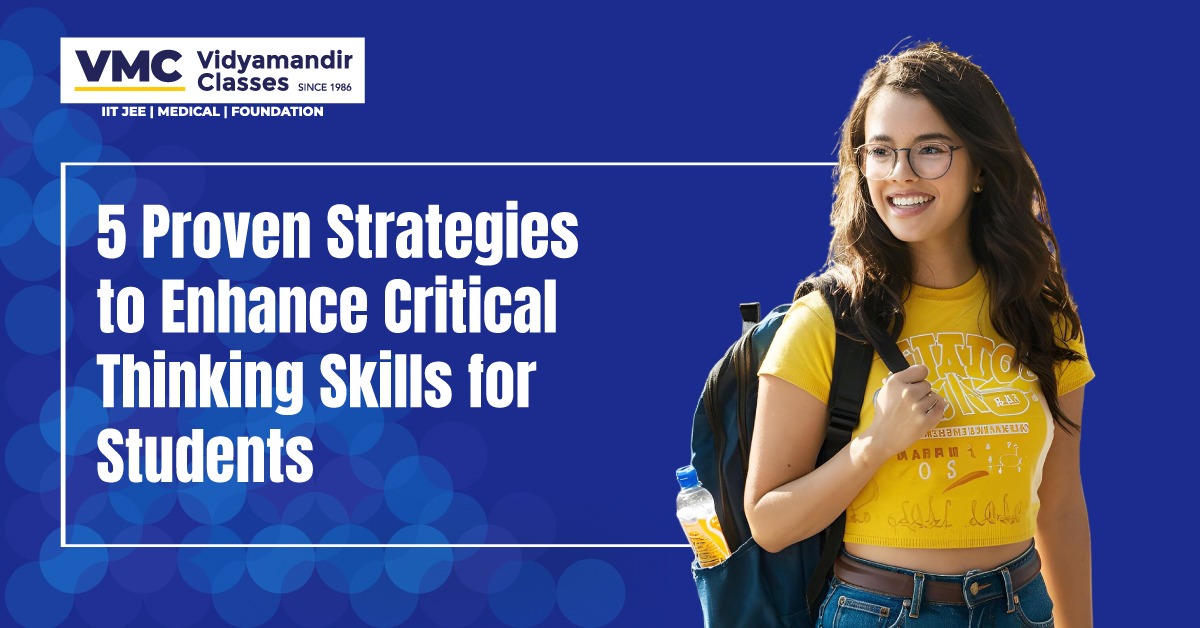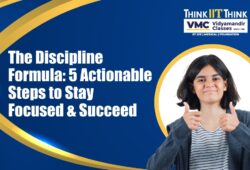5 Proven Strategies to Enhance Critical Thinking Skills for Students
 Posted On
Posted On
162 total views, 2 views today
Critical thinking is an essential skill for success in both academics and life. It empowers students to not only absorb information but to question, analyze, and evaluate it. Whether in a classroom setting or in everyday situations, the ability to think critically allows students to make informed decisions, solve complex problems, and develop a deeper understanding of the world.
But how can students sharpen this crucial skill? Here are five effective strategies to help you strengthen your critical thinking abilities and apply them to academic and real-world challenges.
1. Practice Active Listening
Active listening is more than just hearing words; it’s about engaging fully with the information presented. Whether you’re in a classroom lecture, participating in group discussions, or reading academic material, actively listening ensures that you capture the essence of the message.
- Focus attentively: When attending lectures, block out distractions and listen for key ideas. Pay attention to how concepts are explained and how evidence is presented to support claims.
- Take meaningful notes: Instead of transcribing everything verbatim, jot down the main points, arguments, and evidence provided. This helps in both reinforcing understanding and providing a basis for reflection later on.
- Engage mentally: Challenge yourself to think about how the information relates to what you already know. Ask yourself questions while listening: “How does this concept connect with previous lessons?” or “What assumptions is the speaker making?”
Active listening not only enhances your understanding but also serves as a foundation for deeper thinking and learning.
2. Ask Thought-Provoking Questions
One of the hallmarks of critical thinking is the ability to ask meaningful questions. Critical thinkers don’t just accept information at face value—they dig deeper to uncover underlying assumptions, question the logic behind conclusions, and explore different perspectives.
Here’s how you can cultivate the habit of asking thought-provoking questions:
- Challenge assumptions: Don’t be afraid to question the assumptions on which an argument is based. For instance, if someone claims that “technology is making us less social,” ask yourself, “Is it technology that’s the problem, or the way we use it?”
- Seek explanations: Instead of simply accepting a statement, ask “Why is this the case?” and “How do we know this to be true?” These questions push you to explore the reasoning behind ideas and conclusions.
- Encourage reflection: After learning something new, ask yourself reflective questions like, “What new insights did I gain?” or “How does this change the way I view the topic?” This type of reflection helps solidify learning and encourages you to consider the broader implications of the information.
By making questioning a regular habit, you’ll sharpen your critical thinking and become more adept at evaluating the ideas presented to you.
3. Evaluate Evidence and Sources
In today’s information-rich environment, being able to assess the quality of evidence and sources is a critical skill. Whether conducting research for an assignment or browsing the internet, it’s important to recognize credible sources and distinguish them from unreliable or biased information.
Here are some ways to evaluate evidence and sources effectively:
- Assess credibility: Look at the qualifications of the author or organization presenting the information. Are they experts in the field? Do they have a track record of reliability?
- Identify biases: Consider whether the source has a particular agenda or bias that might color the information. Biased sources often selectively present facts that align with their viewpoint while ignoring contradictory evidence.
- Check for logical fallacies: Logical fallacies are errors in reasoning that undermine the logic of an argument. For instance, if someone claims “everyone is using this product, so it must be good,” they’re making a bandwagon fallacy. Recognizing such fallacies helps you critically evaluate arguments and avoid faulty conclusions.
- Consider alternative viewpoints: Don’t limit yourself to one source of information. Seek out alternative perspectives to gain a more well-rounded understanding of the topic. This approach broadens your knowledge and enhances your ability to weigh differing viewpoints.
By learning to evaluate evidence critically, you’ll ensure that your conclusions are based on solid reasoning rather than misinformation or faulty assumptions.
4. Practice Problem-Solving
Critical thinking often comes into play when solving problems. Whether you’re tackling academic exercises, analyzing real-world scenarios, or engaging in intellectual debates, developing problem-solving skills allows you to approach challenges methodically and logically.
Here’s how you can practice problem-solving to enhance your critical thinking:
- Break problems down: When faced with a complex problem, divide it into smaller, more manageable parts. This makes it easier to analyze and find solutions for each component before addressing the bigger picture.
- Engage in challenging activities: Activities like solving puzzles, participating in debates, or working on case studies can help you hone your problem-solving abilities. These activities push you to think critically, consider multiple solutions, and defend your reasoning.
- Develop logical solutions: Instead of jumping to conclusions, work through problems step by step. Evaluate possible solutions by considering their pros and cons, and use evidence to support your conclusions.
Problem-solving is a hands-on way to apply critical thinking in practical situations, making it an invaluable skill for both academics and life.
5. Reflect and Reason
Critical thinkers continuously reflect on their thought processes. Reflection allows you to recognize your cognitive biases, assess your reasoning, and improve the way you approach problems.
Here’s how you can incorporate reflection and reasoning into your routine:
- Reflect on past decisions: After completing a task or solving a problem, take time to reflect on the process. Ask yourself, “Did I approach this in the best possible way?” and “What could I have done differently?” These reflections help you identify areas for improvement.
- Engage in metacognitive thinking: Metacognition is the act of thinking about your thinking. By regularly examining your own thought processes, you can become more aware of the cognitive strategies you use and recognize opportunities for growth.
- Challenge your thinking: Be willing to re-evaluate your opinions, especially when faced with new evidence. A true critical thinker is open to changing their viewpoint if the evidence warrants it.
Reflection helps to consolidate what you’ve learned and ensures that you continuously refine and improve your critical thinking abilities.
Closing Thoughts
Critical thinking is not just a skill to be used in school; it’s a lifelong tool that can help you navigate the complexities of life. By practicing active listening, asking thought-provoking questions, evaluating evidence, engaging in problem-solving, and reflecting on your own thought processes, you’ll sharpen your ability to think critically. These strategies will not only enhance your academic performance but will also prepare you to face real-world challenges with confidence and clarity. So, take the time to sharpen your edge—your future self will thank you!



